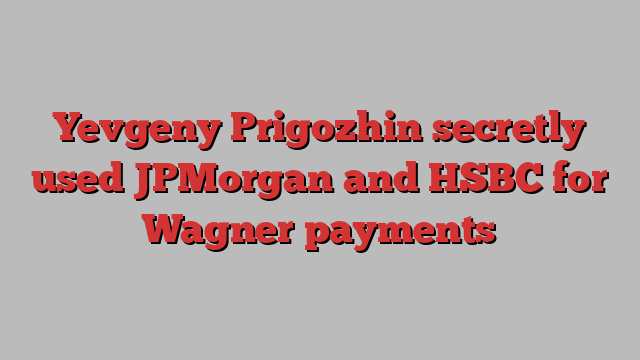
Unlock the Editor’s Digest for free
Roula Khalaf, Editor of the FT, selects her favourite stories in this weekly newsletter.
JPMorgan Chase and HSBC unwittingly processed payments for companies in Africa controlled by the deceased Russian warlord Yevgeny Prigozhin, as his sanctions-hit Wagner private army expanded across a continent where it has been accused of brutal human rights abuses.
Leaked documents obtained by the Center for Advanced Defense Studies (C4ADS), a Washington-based think-tank, show that in 2017 a Sudanese company controlled by Prigozhin made purchases of industrial equipment from China that passed through large western banks.
Wagner, which the US Treasury has accused of “mass executions, rape, child abductions and other brutalities against innocents” in Africa, became infamous for providing mercenary services to repressive dictators and for fighting in Russia’s invasion of Ukraine.
The leaked documents show how Prigozhin, who was assassinated last year after attempting a failed mutiny against Russian President Vladimir Putin, was able to establish a transnational criminal empire in natural resources in part by secretly hijacking the payments systems of western financial institutions.
One invoice shows that in August 2017, Meroe Gold, a Sudanese mining company that was a front for Wagner, sent a payment from a local bank account via JPMorgan Chase as an intermediate bank in New York to a seller in China.
Another invoice from the same year shows that Meroe Gold sent payment for diesel generators and spare parts to a Chinese company via Hang Seng Bank, which is part of the HSBC Group.
There is no evidence that these banks were aware they were handling transactions commissioned by Wagner Group front entities.
Meroe Gold was not under US sanctions at the time of the payments, but Prigozhin had been since 2016. Meroe was in 2018 later put under US sanctions for being “owned or controlled by Prigozhin” and helping him “exploit Sudan’s natural resources for personal gain”.
HSBC declined to comment on the specific transactions in Sudan, but the bank said it was “deeply committed to combating financial crime and to the integrity of the global financial system”.
“We have invested significantly in building and maintaining an effective control framework to detect and mitigate this risk,” it added.
JPMorgan said: “After a review of the limited details shared with us, we have not found any records matching those transactions.”
C4ADS, which has released a report into the leaked documents, said the transactions demonstrated that Prigozhin and Wagner would not have been able to establish a foothold in Africa without benefiting from the legitimate financial system.
Wagner’s growth in countries such as Sudan and the Central African Republic was the function of “a nexus between licit and illicit systems”, said C4ADS.
“To facilitate its early exploitation of natural resources, the internationally sanctioned organisation relied on a network of financial services and transportation networks to move supplies and generate revenue,” it added.
After Prigozhin’s demise in August 2023, the operations he built in Africa were absorbed into entities under direct control of the Russian defence ministry.